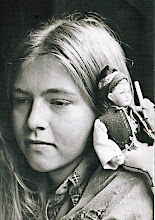The depot was there until 2000, although at that point it was no longer used as a bus depot. The building became the venue for various nightclubs after a new bus depot was built in the 1980s. Over the years, it gradually became fairly seedy and was eventually slated for demolition. Chuck Palahniuk, author of Fight Club, also wrote a book entitled Fugitives and Refugees: A Walk In Portland, Oregon, where he recounts a late-night illicit party in the abandoned depot building. He describes how people rolled bowling balls down makeshift lanes of votive candles. Instead of bowling pins, the targets were china and knick-knacks from junk stores. He also describes running through tunnels that connected the bus lube pits.
The card was sent to Corporal Lute H. Defrieze during World War II when he was stationed at Camp Adair, just north of Corvallis, Oregon. Part of Camp Adair is now a wildlife area, and another part of is the city of Adair Village, with a population of about 1,000.
The sender, F.K.M., had an office in the Lumbermen's Building, which is now on the National Register of Historic Places and known as the Oregon Trail Building. It's about five blocks up the street from where the bus depot used to stand.




















